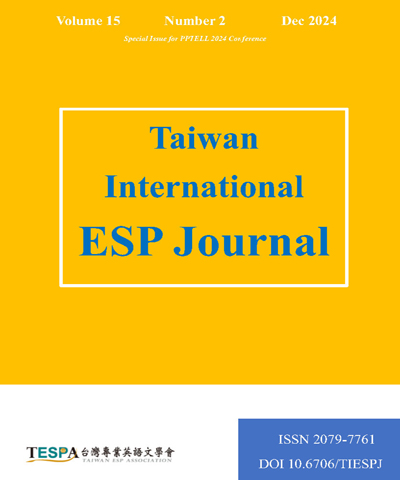
Taiwan International ESP Journal/台灣專業英語文期刊
- OpenAccess
台灣專業英語文學會,正常發行
選擇卷期
- 期刊
- OpenAccess
The internationalization of business has caused many local companies in Taiwan to adopt English as a lingua franca (ELF). When a Taiwanese metal fabrication business was purchased by a U.S.-based multinational conglomerate, the managers needed to quickly improve their English skills so they could communicate with their foreign bosses and co-workers. When the authors were called upon to serve as ELF trainers for 10 managers in fall 2013, we simultaneously conducted action research to explore best practices. This case study aims to (1) identify some issues of intercultural communication in international business, and (2) present pedagogical implications for teaching ELF in a business setting. Data were collected from personal stories told by the managers and correspondence they shared, which were transcribed and edited to serve as the main teaching materials for the class, allowing us to identify important areas of language and culture difference. Using actual workplace communication and stories about workplace issues proved to be a very useful pedagogical approach, allowing discussion of both English problems and cultural differences that had caused misunderstanding.
- 期刊
- OpenAccess
This case study documents the disciplinary writing practices of a non-native English-speaking (NNES) postgraduate student in the field of aeronautics and astronautics engineering at an American university. It discusses how the process of learning to write in a specific discipline involved textual mentorship from disciplinary texts, negotiation with and feedback from the thesis advisor, and the writer's investment in disciplinary knowledge, writing expertise and discourse knowledge. In this case study, it was found that the co-authoring opportunity with the advisor was the most critical enculturation task, facilitating disciplinary writing practices. The revisions made across drafts of research abstracts revealed the multiple, authoritative roles the advisor played-as a language shaper, a content expert, and an experienced disciplinary writer. The level of textual participation also reflected the writer's degree of ownership of his texts. Becoming familiar with content-specific knowledge and discourse norms, the postgraduate writer took increasing responsibility in the practices of writing and publication, and made increasing contributions to his final written texts.
- 期刊
- OpenAccess
In recent years, conducting job interviews in English for workplace purposes in non-English speaking countries has become a trend. To meet this demand in the workplace, colleges have been offering to prepare students for English interviews, particularly in EFL contexts (countries where English is used as a foreign language). However, little research has been conducted to understand how candidates in EFL contexts are prepared. In addition, while much research focuses on factors that might influence the results of the interviews from the perspective of native English speakers, few empirical studies have examined the criteria for evaluating English job interviews from the viewpoints of people both in academia and in the workplace. The purposes of this study are to understand how curricula for English interviews are designed by instructors with business-related experience and those without such experience, and to compare interview evaluation criteria between those in academia and in the workplace in the Taiwanese EFL context. The research employed a questionnaire and in-depth, semi-structured interviews with 10 university instructors (5 with and 5 without business-related experience) and 20 managers in the business world (10 in hotels, and 10 in the information technology (IT) industry). Differences in curriculum design, evaluation criteria, and perceived issues and problems are found between instructors with different backgrounds and between the instructors and workplace managers. The results of the study yield important implications for university-workplace partnerships and contribute to our understanding of how to collaborate through partnerships in order to help job applicants prepare better for English job interviews.

